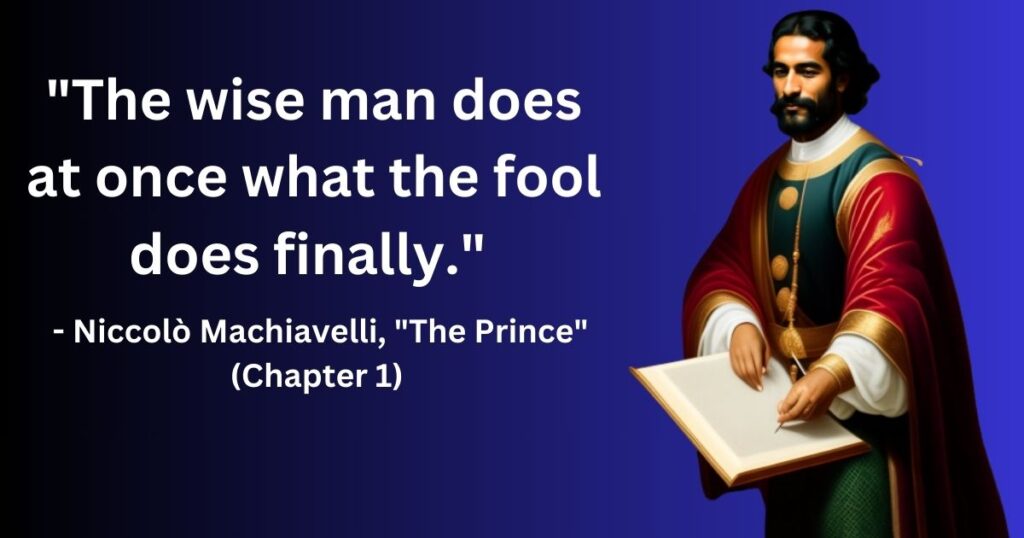State and Statecraft by Niccolo Machiavelli is the famous concept in politics, a field that has always been filled with power dynamics and intrigue. However, perhaps no one has explored the nuances of statecraft as extensively as Niccolo Machiavelli, the Italian political philosopher who lived in the 16th century.
His book, “State and Statecraft,” has had a significant impact on political thinking, reshaping the way we view power relations in the political arena. If you’re interested in studying statecraft, this book is an essential read.
Key Takeaways
- Studying Machiavelli’s work on statecraft is essential for understanding the complexities of power dynamics in politics.
- State and Statecraft is a book that has had a significant impact on political thinking.
- Machiavellian philosophy challenges conventional notions of morality and ethics in politics.
Understanding State and Statecraft by Niccolo Machiavelli
When it comes to the study of statecraft and power dynamics in politics, the name Niccolò Machiavelli stands out. Born in Florence, Italy, in 1469, Machiavelli is considered one of the most influential political thinkers of the Renaissance era. His works on statecraft, including “The Prince” and “Discourses on Livy,” have had a profound impact on the way we understand politics and government.
As a political philosopher, Machiavelli believed that the ends justified the means. He argued that rulers should do whatever is necessary to maintain their power, including using deception, violence, and coercion when required. This philosophy is known as Machiavellianism and is often associated with unscrupulous and immoral behavior in politics.
Exploring Machiavellian Principles of Statecraft

When it comes to Machiavellian statecraft, the central principle is the acquisition and maintenance of power. According to Machiavelli, the successful ruler should prioritize the preservation of their state above all else, even if it means being ruthless and manipulative.
One of the key strategies for maintaining power is to instill fear in one’s subjects. Machiavelli argued that a good ruler should be feared rather than loved, as fear is a more reliable motivator than affection. He believed that by cultivating a reputation for being strong and decisive, a ruler could prevent others from challenging their authority.
| Machiavellian principles of statecraft: | Examples: |
|---|---|
| The ends justify the means | Machiavelli famously wrote that rulers should do whatever it takes to maintain their power, even if it means breaking moral or ethical codes. |
| Keep your friends close and your enemies closer | Machiavelli believed that it was important to be aware of potential threats and to stay ahead of them. This meant keeping one’s enemies close and being vigilant about their movements. |
| Divide and conquer | Machiavelli advised rulers to play different groups against each other in order to maintain their power. By pitting factions against each other, a ruler could prevent any one group from becoming too powerful. |
Another important aspect of Machiavellian statecraft is the need for flexibility and adaptability. The successful ruler must be able to adjust their strategies and tactics as circumstances change. Machiavelli argued that the most effective rulers were those who could balance conflicting interests and respond quickly to new challenges.
“It must be remembered that there is nothing more difficult to plan, more doubtful of success, nor more dangerous to manage than a new system. For the initiator has the enmity of all who would profit by the preservation of the old institution and merely lukewarm defenders in those who would gain by the new ones.” – Niccolò Machiavelli
Overall, Machiavellian statecraft emphasizes the importance of power, adaptability, and ruthlessness in maintaining political control. While his ideas have been controversial and often criticized, they continue to influence our understanding of politics and the behavior of those in power.
State and Statecraft Analysis in Machiavelli’s Works
Going deeper into the analysis of statecraft in Niccolò Machiavelli’s works, you will find a wealth of context and examples that display his views on power and control. “The Discourses on Livy” is one of Machiavelli’s most famous works, in which he explores the history of Rome and its political organization. This extensive analysis helps the reader understand how Machiavelli’s views on statecraft were shaped by his deep understanding of history and politics.
In “The Prince,” Machiavelli offers a more concise and precise understanding of his ideas on statecraft. The book is structured around advice to a ruler on how to maintain control and keep their power secure. The principles presented in the book include the importance of maintaining a strong military, the necessity of being feared over loved, and the importance of being decisive and ruthless.
| Thesis Statement: | Machiavelli’s writings on statecraft offer a nuanced and complex understanding of power dynamics in politics. |
|---|---|
| Contextual Example: | In “The Prince,” Machiavelli states, “It is better to be feared than loved, if you cannot be both.” This quote demonstrates the importance Machiavelli placed on the ruler being feared rather than loved in order to maintain control and keep their power secure. |
| Further insight: | Machiavelli believed that the use of force and violence was sometimes necessary in order to maintain power. He argued that a ruler should be willing to use any means necessary to achieve their goals and maintain control over their state. |
Overall, the analysis of state and statecraft in Machiavelli’s works offers a unique perspective on political power and control. By examining his writings in detail, you can gain a deeper understanding of how politics works and the strategies that rulers can use to maintain their power.
Machiavelli’s Political Theory
Niccolò Machiavelli’s political theory is a comprehensive analysis of statecraft and governance that has had a profound impact on political philosophy. The overarching theme of his theory is that effective governance requires a ruler who is willing to take decisive and often ruthless action to maintain power and stability in their state.
Machiavelli believed that the primary goal of the ruler should be to maintain the stability and security of the state, even if this involved acting in ways that were considered immoral or unethical. He famously argued, “it is much safer to be feared than loved, if one of the two has to be lacking.” This statement reflects one of Machiavelli’s core principles of statecraft: that the ruler must be willing to use force if necessary to keep the people in line and ensure the stability of the state.
Machiavelli’s political thought was a significant departure from previous political philosophies, which emphasized moral and ethical considerations in governance. His ideas challenged conventional notions of morality and ethics in politics, and instead focused on practical considerations of power and stability. His work has since been extensively studied and debated, with many scholars drawing inspiration from his ideas to inform modern political theories and practices.
The Prince by Niccolò Machiavelli

If you’ve heard of Niccolò Machiavelli, chances are you’ve also heard of his most famous work, “The Prince.” Written in the early 16th century, the book is a practical guide for rulers on how to gain and maintain power, even if it means using ruthless tactics.
In “The Prince,” Machiavelli argues that a ruler’s primary responsibility should be to preserve their power, even if it means acting against traditional ethical standards. He emphasizes the importance of a strong military and the use of fear as a tool to maintain control. He also encourages rulers to be cunning and adaptable, capable of changing tactics and alliances as needed to stay in power.
Machiavelli’s writing style in “The Prince” is direct and often blunt, without the flowery prose commonly found in political writing of his time. He is unapologetic in his defense of ruthless tactics, even going so far as to suggest that it is better to be feared than loved. His frankness and practical advice have made “The Prince” a controversial yet influential work in the study of political philosophy.
Despite its reputation, “The Prince” is not a simple handbook for tyrants. Machiavelli’s ideas in the book are complex and nuanced, with many layers of interpretation. Some scholars even argue that “The Prince” is a satire or a warning against the dangers of unchecked power. Regardless of one’s interpretation, it is clear that “The Prince” has had a significant impact on political thought and continues to be studied and debated to this day.
Machiavellian Philosophy and Statecraft
Studying Niccolo Machiavelli’s work on statecraft challenges traditional notions of morality and ethics in politics. His ideas, often referred to as “Machiavellianism,” emphasize the use of power and strategies for maintaining control over the people.
Machiavellian philosophy is often associated with being ruthless and immoral, but it also highlights the importance of understanding power dynamics in politics. By recognizing the realities of how leaders gain and maintain control, we can better understand the often complex and ambiguous actions of politicians and other leaders.
“It is far safer to be feared than loved if you cannot be both.” – Niccolò Machiavelli
Machiavelli’s ideas challenge us to think critically about the nature of power and how it is used in politics. While his approach may be controversial, his work remains relevant in the modern study of statecraft and international relations.
To fully grasp the implications of Machiavellian philosophy on statecraft, it is important to consider how his ideas compare to other philosophers’ perspectives. By examining other political philosophers, we can understand Machiavelli’s unique contributions to the study of statecraft and how his ideas continue to shape the field today.
Statecraft in Political Philosophy
When discussing statecraft and political philosophy, Niccolò Machiavelli’s ideas are often at the forefront of the conversation. His views on power and control have challenged traditional notions of morality and ethics in politics, making him a controversial figure in the field.
Machiavelli’s philosophy is characterized by a focus on the realities of power and the need for rulers to maintain control. He believed that effective leaders must be willing to do whatever it takes to ensure stability and order, even if it means resorting to controversial tactics. This perspective is in stark contrast to other political philosophers who emphasize the importance of morality and ethics in leadership.
Despite the controversy surrounding Machiavelli’s ideas, his contributions to the study of statecraft cannot be ignored. His writings have had a significant impact on political philosophy and have influenced the way we think about power dynamics in politics. His work has also sparked ongoing debates about the role of morality in leadership and the extent to which rulers should be willing to go to achieve their goals.
Other philosophers have also offered insights into statecraft and its role in politics. For example, Thomas Hobbes argued that the state’s primary function is to maintain order and stability, while John Locke emphasized the importance of individual rights and limited government. These perspectives offer a stark contrast to Machiavelli’s ideas, highlighting the diversity of thought within the political philosophy field.
Overall, Machiavelli’s ideas on statecraft have had a profound impact on the way we think about politics. While his views may be controversial, they offer a unique perspective on power dynamics and the role of leadership in maintaining stability and order. By examining Machiavelli’s work and comparing it to other philosophical perspectives on statecraft, we can gain a deeper understanding of the complexities of political power and the challenges faced by those who seek to wield it.
You Can Read: Plato’s Ideal State: The 4 Powerful Pillars.
Conclusion
Congratulations! You have now been introduced to the world of Niccolò Machiavelli and his influential work on statecraft. By studying his ideas and principles, you have gained a deeper understanding of power dynamics in politics and the strategies behind maintaining control.
“State and Statecraft” sheds light on the complex relationships between rulers and the ruled, and the importance of using power effectively in order to maintain political stability. Machiavelli’s theories have had a lasting impact on political philosophy, and his ideas continue to shape our understanding of politics today.
We encourage you to explore “State and Statecraft” for yourself and to consider how his principles might challenge your own views on morality and ethics in politics. By engaging with Machiavelli’s work, you may broaden your perspectives on power dynamics in politics and become a more informed citizen.
FAQ
Q: Can I purchase “State and Statecraft by Niccolò Machiavell” online?
A: Yes, you can purchase “State and Statecraft by Niccolò Machiavell” online through various platforms and book retailers.
Q: Why is studying power dynamics in politics important?
A: Studying power dynamics in politics is important because it helps us understand how leaders maintain control and make decisions that shape society.
Q: How has Niccolò Machiavell reshaped thoughts on politics?
A: Niccolò Machiavell’s work on statecraft has challenged traditional notions of morality and ethics in politics, emphasizing the practicality of power and strategies for maintaining control.
Q: What are Niccolò Machiavell’s key concepts of statecraft?
A: Niccolò Machiavell’s key concepts of statecraft include the use of power, strategies for maintaining control, and the relationship between the ruler and the ruled.
Q: What examples of statecraft does Machiavelli provide in his writings?
A: Machiavelli provides various examples of statecraft in his writings, exploring different contexts and scenarios to illustrate his theories on governance and leadership.
Q: How has Machiavelli’s political theory influenced the understanding and practice of politics?
A: Machiavelli’s political theory has had a significant impact on political philosophy, challenging conventional ideas and shaping discussions on power, leadership, and governance.
Q: What are the core themes and principles presented in Machiavelli’s “The Prince”?
A: “The Prince” by Niccolò Machiavelli explores themes of power, manipulation, and strategies for maintaining control in political leadership.
Q: How does Machiavelli’s philosophy challenge conventional notions of morality in politics?
A: Machiavelli’s philosophy challenges conventional notions of morality by emphasizing the practicality of power and the sometimes necessary use of manipulation and coercion in politics.
Q: How do other philosophers’ perspectives on statecraft compare to Machiavelli’s views?
A: Other philosophers may have different perspectives on statecraft, with some emphasizing moral principles and others emphasizing the practical realities of political power, which can be similar to or divergent from Machiavelli’s views.










